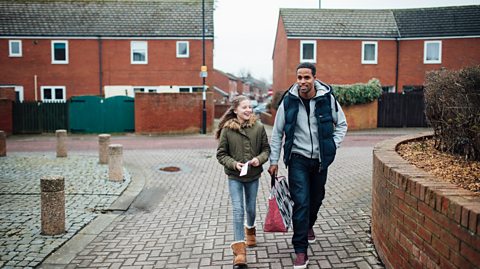As a parent, it can be difficult to identify bullying as it's happening, before deciding what to do next.
Star parents Harry Judd and TV presenter Konnie Huq discuss their own experiences of bullying in school, how to spot the signs of bullying and ways to approach the subject with your child.
Read on for more top tips on recognising bullying as a parent from the Anti-Bullying Alliance
Presenter Konnie Huq and McFly's Harry Judd discuss their experiences of bullying in school and as parents
Harry (00:00:00:00):I think itÔÇÖs important to remember that you know your child best.
Konnie (00:00:02:23):Yeah.
Harry (00:00:03:04):And that a parentÔÇÖs gut instinct is often quite powerful.
Intro
Konnie (00:00:10:24):So when you were having a hard time at school, were there any signs your parents wouldÔÇÖve picked up on?
Harry (00:00:15:10):My brother was a couple of years above me, and he noticed that I wasnÔÇÖt hanging out in the same groups.
Konnie (00:00:20:09):Yeah.
Harry (00:00:21:02):So he used to ask me, but I instantly just was like, nah, itÔÇÖs fine.I donÔÇÖt like them anyway.
Konnie (00:00:26:03):Yeah.
Harry (00:00:26:14):I remember really experiencing that sort of feeling of anxiety and feeling low about it and,The main emotion I felt was shame, I felt quite like ashamed and embarrassed.
Konnie (00:00:37:05):Yeah.And often, that is one of the signs to look out for,if your child has suddenly become sort of more quiet, more introverted,as you mentioned, if their friendship group has changedor theyÔÇÖre not hanging out with their friends as much.
Harry (00:00:51:05):These things could be really difficult to spot.You shouldnÔÇÖt be beating yourself up if you donÔÇÖt necessarily spot everything.Do your kids use devices, internet?
Konnie (00:01:00:03):You know what? I do worry about when they were in secondary school,because although theyre sort of on tablets now and then at home,the real scary thing to me is when theyre walking to school on their own,theyve got their own mobile phone.
Harry (00:01:13:22):Do you have friends who have kids in secondary school?And if they donÔÇÖt have a phone, then they get teased.
Konnie (00:01:18:19):Yeah.
Harry (00:01:18:24):If they donÔÇÖt have a TikTok account or this, then they get teased.
Konnie (00:01:21:24):Really? Oh no!
Harry (00:01:22:21):Yeah. So itÔÇÖs really about how online bullying can be harder to spot,but one good thing to look out for is changes in behaviour.So, if your child has stopped using a certain app, or if theyÔÇÖre reacting in an anxious way to a notification going off,because yeah, it can be a lot more difficultto spot.
Konnie (00:01:40:04):I mean, the thing about online bullying in people have anonymity.If thereÔÇÖs a photo of you wearing some outfit or whatever,(Indistinct chatter)ItÔÇÖs just, itÔÇÖs kind of horrible isnÔÇÖt it?
Harry (00:01:52:18):Yeah, really horrible.You know, like you can have a load of positive comments,And one negative one and then, thatÔÇÖs the one you focus on.
Konnie (00:01:59:23):Yes.
Harry (00:02:00:06):And yeah, I dont know why I do it to myself and like,Just look at the comments, Im likeOh!
Konnie (00:02:03:18):Ouch!
Harry (00:02:05:19):For me, itÔÇÖs more about helping your child to navigate their way through it.So hopefully, they feel comfortable enough to communicate with you whatTheyÔÇÖre going through. But, itÔÇÖs about how to give them the strength to navigate their way through it.But I think itÔÇÖs important to remember that you know your child best,and that a parentÔÇÖs gut instinct is often a quite powerful thing.
Konnie (00:02:27:07):Obviously, the best outcome is that your child will tell you and talk to you.But if not, itÔÇÖs always good to know what to look out for.
You might have a feeling that your child is being bullied or is bullying someone else but arenÔÇÖt sure what to do next - to establish this, itÔÇÖs important to define the word ÔÇÿb│▄▒¶▒¶▓Ô¥▒▓È▓ÁÔÇÖ. We spoke to Martha Evans, Director at Anti-Bullying Alliance, to get her expert insight and adviceÔǪ
What is bullying?
ÔÇ£Bullying is the repetitive, intentional hurting of one person or group by another person or group, where the relationship involves an imbalance of power. It can happen face-to-face or online.ÔÇØ
"The term ÔÇÿb│▄▒¶▒¶▓Ô¥▒▓È▓ÁÔÇÖ can often be misidentified and applied to something that isn't bullying."
"It's really important that we allow children to have a row. Rows are an important part of learning and growing. We should allow children the space to learn how to communicate with each other when they donÔÇÖt get on," explains Martha.
"However, bullying is not a one-off incident, it takes place over a long time. Children who experience bullying can end up missing school, have poor wellbeing and even experience depression. We know from research that the impact of bullying can last well into adulthood.ÔÇØ
10 signs to look out for
- Changes in usual behaviour
- Falling out with their usual friendship group
- Reluctance to go to school or skipping classes
- Becoming more introverted or withdrawn
- Acting out at home or fighting more with siblings
- Torn clothes, missing items or missing money
- Unexplained bruises, cuts or marks
- Trouble sleeping or bed-wetting
- Significantly more or significantly less time spent on their phone or other devices
- Unexplained stomach aches or illnesses that occur around certain times like mornings before school or just before PE lessons

What if your child is involved in bullying someone else?
ÔÇ£Our research has shown that children who bully often have poorer wellbeing than children who are being bulliedÔÇØ explains Martha. ÔÇ£Therefore, we know that if a child is bullying, there are reasons behind it and often those reasons are very unhappy.ÔÇØ
Here's Martha advice on approaching your child if you suspect they are involved in bullying
1. Try not to accuse them
ItÔÇÖs important to have an open conversation without accusations. Accusing a child straight away may cause them to clam up. Even though you may think they deserve a telling off, itÔÇÖs important to hear them out first.
2. Find out the root cause
You may feel angry or embarrassed but itÔÇÖs best to talk to your child to find out why they are bullying another student. Did they feel peer pressure? Are they seeing negative content online? Do they have low self esteem or poor wellbeing themselves, as research suggests they might? If so, why? ItÔÇÖs important to establish the facts in order to move forward.
3. Be a role model at home
Help your child understand what bullying is, why itÔÇÖs wrong and how it can impact people by encouraging the use of respectful language and positive actions at home. Talking about how we should treat each other is also important.
Whether your child is being bullied or doing the bullying themselves, it can be easy for parents to blame themselves.
Remember to take time for yourself and talk to friends and family if you need support. For more resources on bullying look below
If you notice your child is showing signs of serious distress like anxiety or depression, make an appointment with their GP.
For more information about Cyberbullying, head over to
C┤¾¤¾┤½├¢ have made some animations on the things your child can control around bullying - they're here on ┤¾¤¾┤½├¢ iPlayer.
Martha Evans is Director of the
Anti-Bullying Week takes place from the 13 to 17 November and is organised by
in England and Wales
in Scotland
in Northern Ireland

More from ┤¾¤¾┤½├¢ Bitesize Parents' ToolkitÔǪ
Parents' Toolkit
Fun activities, real-life stories, wellbeing support and loads of helpful advice - we're here for you and your child.

Where does bullying happen and how can you tackle it?
Conversation with star parents Harry Judd and Konnie Huq, as well as expert advice to help you understand where bullying happens.

How to help your child reach out about bullying
Equipping your child with the tools they need to open up and understand that they're not alone during these tough moments.

Four steps to chatting with your child about their mental health
Starting a conversation about mental health isn't easy. Especially if your child is reticent to open up. This advice from the charity Young Minds may help.

Making a mental health support network to help you & your child
Advice on reaching out for help for you and your child. With tips from mental health charity Young Minds.

How can I talk to my kids about their emotions? - The Super Tutors
Natalie Costa, aka 'The Child Whisperer', explains how you can talk to your child about their feelings and help them manage their emotions.
